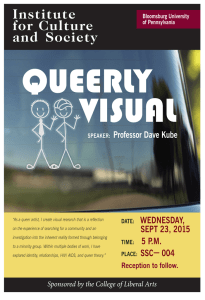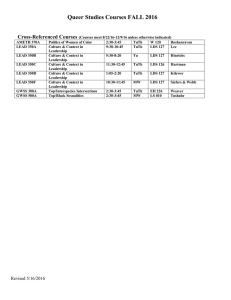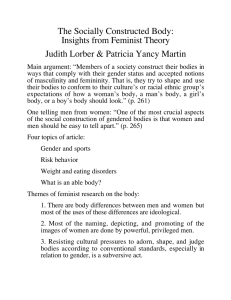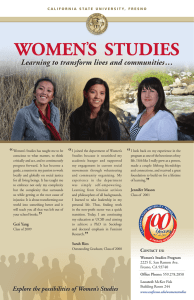Queer Studies Courses SPRING 2016 Cross-Referenced Courses
advertisement
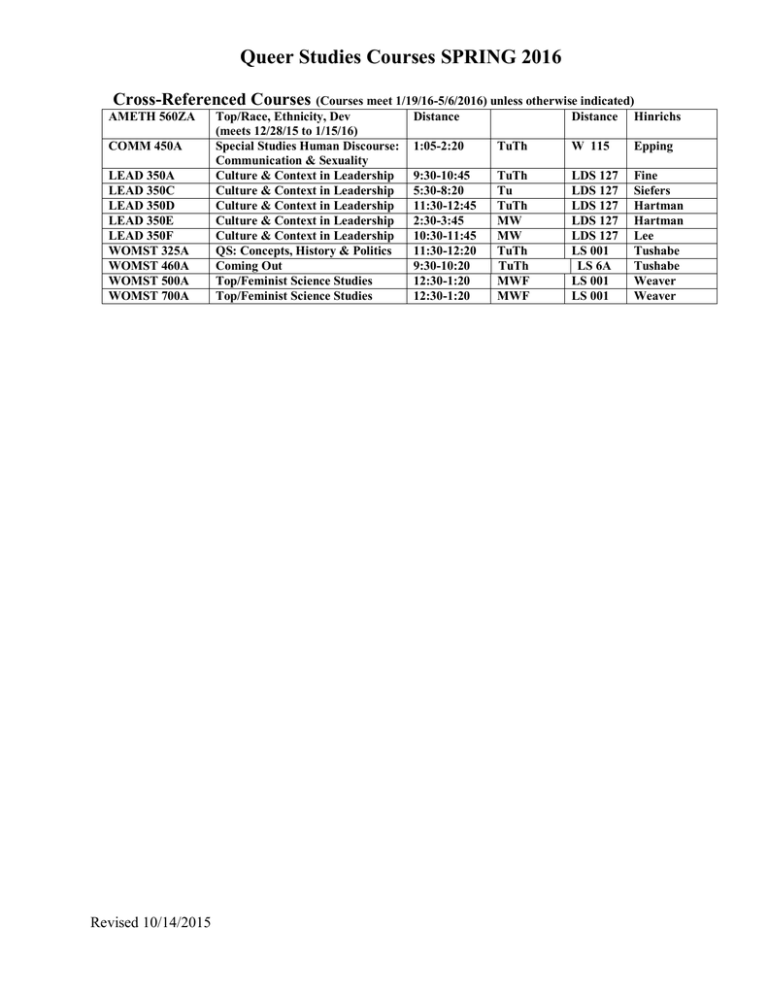
Queer Studies Courses SPRING 2016 Cross-Referenced Courses (Courses meet 1/19/16-5/6/2016) unless otherwise indicated) AMETH 560ZA COMM 450A LEAD 350A LEAD 350C LEAD 350D LEAD 350E LEAD 350F WOMST 325A WOMST 460A WOMST 500A WOMST 700A Revised 10/14/2015 Top/Race, Ethnicity, Dev (meets 12/28/15 to 1/15/16) Special Studies Human Discourse: Communication & Sexuality Culture & Context in Leadership Culture & Context in Leadership Culture & Context in Leadership Culture & Context in Leadership Culture & Context in Leadership QS: Concepts, History & Politics Coming Out Top/Feminist Science Studies Top/Feminist Science Studies Distance Distance Hinrichs 1:05-2:20 TuTh W 115 Epping 9:30-10:45 5:30-8:20 11:30-12:45 2:30-3:45 10:30-11:45 11:30-12:20 9:30-10:20 12:30-1:20 12:30-1:20 TuTh Tu TuTh MW MW TuTh TuTh MWF MWF LDS 127 LDS 127 LDS 127 LDS 127 LDS 127 LS 001 LS 6A LS 001 LS 001 Fine Siefers Hartman Hartman Lee Tushabe Tushabe Weaver Weaver Queer Studies Course Descriptions Spring 2016 WOMST 325 Queer Study/Concept/History/Politics Section A: TuTh 11:30—Tushabe Description Coming Soon! WOMST 460 Coming Out and Sexual Identity Section A: TuTh 9:30 --Tushabe Since the 1969 Stonewall Rebellion, the discourse on “coming out” has complicated notions of transparence through speech acts, secrecy and silence. Judith Bulter suggests that through speech acts, one is always coming out into another “closet.” This course investigates ways in which language silences some aspects of our lives and makes free and visible others. We will examine the meanings, implications, and possibilities of coming out at the intersection of colonialism, race, and class. Students will consider how narratives of coming out and their impact on freedom, policies and homophobic attitudes as they critically analyze homosexuality from historical, cultural, ethical, legal and philosophical perspectives, and the universal queer/homosexual identity. WOMST 500 Topics Course/Feminist Science Studies Section A: MWF 12:30 --H. Weaver Science and technology are central to many of our lives today. We connect with people through cell phones, email and facebook; we use medicines that both shape and save our lives; and we do things like go to the gym and the grocery store, where machines read our interactions and even our bodies. Further, many of us have experienced and deployed science as a powerful basis for an argument, which is to say, we know that when “science says,” people listen. However, science and technology are also cultural practices, neither of them neutral with regards to race, sexuality, ability, or gender, as we can witness in histories like that of eugenics. This class examines those histories as well as their present, thinking through the ways that science and technology are involved with issues of race, gender, sexuality, and empire. Our topics include feminist, queer, and indigenous epistemologies; race and the environment; queer and transgender natures; race and biopolitics; feminist disability studies; Native American DNA; science and colonization; African sciences and science multiple; feminist and queer anthropologies; cyborgs; disability studies; gender and laboratory animals; feminist physics; and more. WOMST 700 Topics Course/Feminist Science Studies Section A: MWF 12:30 --H. Weaver Science and technology are central to many of our lives today. We connect with people through cell phones, email and facebook; we use medicines that both shape and save our lives; and we do things like go to the gym and the grocery store, where machines read our interactions and even our bodies. Further, many of us have experienced and deployed science as a powerful basis for an argument, which is to say, we know that when “science says,” people listen. However, science and technology are also cultural practices, neither of them neutral with regards to race, sexuality, ability, or gender, as we can witness in histories like that of eugenics. This class examines those histories as well as their present, thinking through the ways that science and technology are involved with issues of race, gender, sexuality, and empire. Our topics include feminist, queer, and indigenous epistemologies; race and the environment; queer and transgender natures; race and biopolitics; feminist disability studies; Native American DNA; science and colonization; African sciences and science multiple; feminist and queer anthropologies; cyborgs; disability studies; gender and laboratory animals; feminist physics; and more. Revised 10/14/2015

